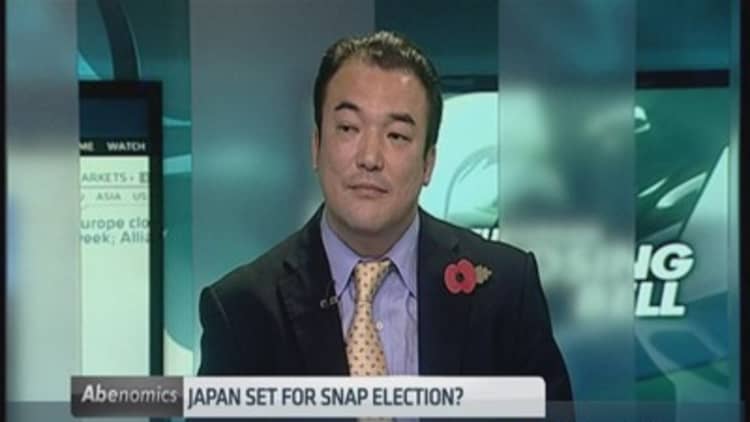If Japanese Prime Minister Shinzo Abe were to call a snap election, it could extend the country's stock rally, but analysts say it would undermine confidence in his ability to put the economy back on a stable path in the longer-run.
Speculation is building that Abe is considering dissolving the lower house of parliament, the more powerful of the two chambers, and announcing a snap election in mid-December if he decides to postpone the 2015 sales tax hike.
"A snap election could have the virtue of giving the government a stronger mandate," Marcel Thieliant, Japan economist at Capital Economics wrote in a note.
"But it would not be a long-term positive if coupled with a delay in the tax hike… [because it] would probably be seen as a watering down of a key element of Abenomics and could weaken momentum for further reform," he said.

The rationale for timing the snap election after a decision to delay the tax hike is to maximize the Liberal Democratic Party's (LDP) chances of securing as many seats possible, says Martin Schulz, senior economist at Fujitsu Research Institute.
"I'm totally unhappy with this. The LDP is back to their old ways of calling snap elections here and there to maximize some election wins, and looking at short-term issues," said Schulz.
Read MoreAbe balances tax rise against economic damage
"Everything promised by Abenomics – structural reforms, long-term stability, rebalancing the economy – that's all forgotten in this," he said.
Japan's planned second sales tax hike to – 10 percent from 8 percent – is controversial due to the fragile state of the economy.
Advocates argue that a tax hike is necessary to slow the rise in Japan's public debt, which at twice the size of its economy is the worst in the developed world. Meanwhile, opponents say that another round of fiscal tightening would weigh further on consumer spending and derail the economy.
Responding to speculation over a possible delay in the second sales tax hike, Japanese Finance Minister Taro Aso on Wednesday said that it had not "been decided at all". Shortly after, however, he noted that Japan's economy was in need of "some form of stimulus."
In April, the sales tax was raised to 8 percent from 5 percent, the first such increase in almost two decades, knocking the wind out of the economy.
Read MoreTokyo governor: 10% sales tax a'difficult' decision
Contrary to Schulz, Nizam Idris, head of strategy for fixed income and currencies at Macquarie Bank says he would read a snap election as Abe's determination to maintain on the reform path.
"If you take a step back, the decision to call a snap election says Abe is not getting the support for another hike in the sales tax so he needs a stronger mandate," he said. "Abe is still intent on going forward with the reforms," he added, noting that a snap election would be supportive of dollar-yen.
Greg Gibbs, head of Asia Pacific markets strategy at RBS says it is unclear whether this is good or bad for the yen.
"On the one hand, a fresh term could afford Abe more time to deliver on his reform agenda and boost confidence in the economy," he said. "On the other hand, if he is putting on ice a key plank of his fiscal reform ...it suggests that Abe is slipping back into the political mould of securing power for its own sake rather than exercising it boldly to achieve a better long-term outcome for his nation even if it may not have popular support."
Read MoreJapan economy still struggling with tax hike, data show
"If the market is questioning the agenda and resolve of the Abe government to deliver on economic and fiscal reforms, then it may be negative for the JPY ," he added.
As for Japanese stocks, Jonathan Garner, strategist at Morgan Stanley says while the prospect of an election brings about uncertainty for investors, which suggests volatility in the near-term, "a renewed and extended mandate for Abe, particularly if this involved delaying or abandoning the second consumption tax hike, would be a medium-term market positive."
Garner says an Abe victory in a snap election would increase the probability of the Topix reaching the bank's "bull case" target of 1,865 by September 2015.


